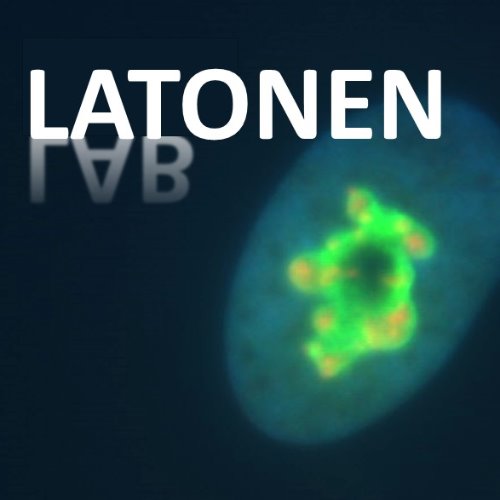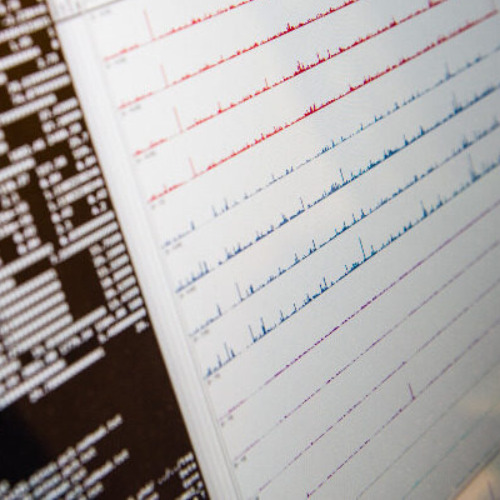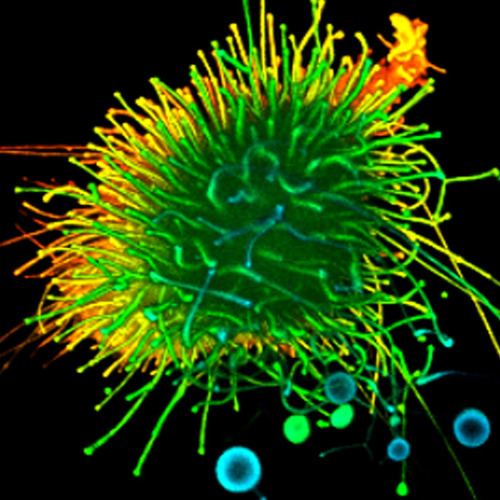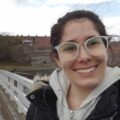
Kvantitatiivinen solubiologia
Johtajat
In the Quantitative Cell Biology laboratory, we study the biology of cells through the prism of quantitative sciences. We use cutting edge quantitative bio-imaging tools to count biomolecules such as proteins or mRNAs, measure their interactions, clustering or quantify their motion in live cells of any organism. We develop our own software tools to analyze this data. We use biochemistry, genetics and molecular/cell biological methods to decipher how genetic or epigenetic perturbations affect our “in cellulo” quantitative measurements. Then, we integrate this wealth of quantitative data to parametrize predictive mathematical models of complex, intricate cellular processes. We are in particular fascinated by the outstanding questions of how a cell takes the decision to divide into two cells, this so peculiar trait of living things. How did evolution shape cell division cycle pathways to adjust the biophysical features of each cell type to its particular functions or environment? And why cells sometimes (often!) decide NOT to divide, but instead remain quiescent, differentiate or commit suicide? Those simple fundamental questions are extremely relevant to many biomedical challenges including the limited efficiency of current anti-cancer therapeutic approaches. In particular, we are studying how the decisions to divide, to differentiate, or to remain quiescent are coordinated at the molecular level in lymphocytes and cardiomyocytes. On the medium term, our goals are to understand in depth how chromosomal translocations common in Acute Lymphoblastic Leukemia (ALL) favor the decision to proliferate over normal differentiation, and to find druggable molecular targets to re-establish cardiomyocytes division to repair the cardiac muscle post-injury.
Current lab members
Amina Tariq (2024, M.Sc. intern and project researcher)
Bernardo Moreira Soares Oliveira (postdoctoral researcher)
Florencia Guerra (doctoral researcher)
Sherif Abd El Fattah (postdoctoral researcher)
Yasin Arafat (M.Sc. thesis)
Saana Elay (M.Sc. intern)
Alumni
Aleksanteri Seppälä (20203-2024, M.Sc. thesis, co-supervision with Kirsi Ketola)
Aya Asser (2022-2024, project researcher)
Eveliina Koponen (2022-2023, B.Sc. thesis)
Franziska Herget (2024, ERASMUS exchange M.Sc. student from Heidelberg, Germany)
Gabriela Was (2023, ERASMUS exchange B.Sc. student from the University of Krakow, Poland)
Ilona Leppäjärvi (2023, B.Sc. thesis)
Jonne Nieminen (2022-2023, M.Sc. intern)
Mustafa Munawar (2022, postdoctoral fellow)
Nkiruka Osegbe (2022, M.Sc. intern)
Petra Raitaniemi (2023, M.Sc. thesis)
SaiTejveer Santhan (2023-2024, International Student Exchange then M.Sc. thesis)
Sara Leskinen (2021, M.Sc. intern)
Teemu Mäki-Maunus (2022 & 2023, B.Sc. intern)
Yhteistyö
-
Toronto Hospital for Sick Children, Canada
-
Rennselaer Polytechnique Institute, Troy, NY, USA
-
Wellcome Trust for Cell Biology, University of Edinburgh, UK
-
-
 Syövän stressivasteiden biologia - Latonen lab 01.01.2019 -
Syövän stressivasteiden biologia - Latonen lab 01.01.2019 - -
 Steroidireseptorien säätelymekanismit - Niskanen lab 01.09.2020 -
Steroidireseptorien säätelymekanismit - Niskanen lab 01.09.2020 - -
 Rilla Lab 01.09.2013 -
Rilla Lab 01.09.2013 - -
 Epigenomics of vitamin D 01.10.2000 -
Epigenomics of vitamin D 01.10.2000 -
Tiedostot
1 kappalettaJohtajat
Tutkijatohtorit
-
Bernardo Moreira Soares
TutkijatohtoriBiolääketieteen yksikkö, Lääketieteen laitos, Terveystieteiden tiedekunta -
Sherif Abdelfattah
ProjektitutkijaBiolääketieteen yksikkö, Lääketieteen laitos, Terveystieteiden tiedekunta
Väitöskirjatutkijat
Teknikot
Muut ryhmän jäsenet
-
Yasin Arafat, M.Sc. thesis candidate [email protected]

